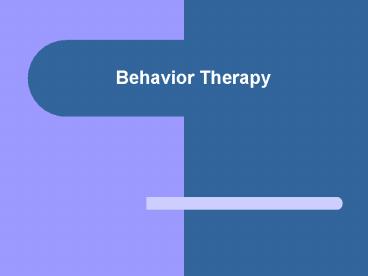Behavior Therapy PowerPoint PPT Presentation
1 / 38
Title: Behavior Therapy
1
Behavior Therapy
2
Review
- Psychoanalysis
- Interpersonal Psychotherapy (IPT)
- Client Centered Therapy (Humanistic)
- Behavior Therapy
- Cognitive Behavior Therapy
- Community Psychology
- Ethics
3
Behavior Therapies
- Systematic Desensitization
- Exposure therapy
- Invivo desensitization
- Flooding
- Token Economy
- Modeling
4
Conditioning Paradigm Terminology
- UCS- Unconditioned stimulus which naturally,
without learning elicits. - UCR- Unconditioned response-reflex
- CS- Conditioned stimulus-previously neutral
stimulus that, through repeated paring with UCS,
elicits a . - CR- Conditioned response
5
Conditioning Paradigm
- UCS------------------------------?UCR
- Meat
Salivation -
-
- CS--------------------------------? CR
- Sound of Experimenter-------? Salivation
6
The Dorm and Classical Conditioning
- UCS------------------------------?UCR
- Hot Water Jump
-
-
- CS--------------------------------? CR
- Toilet Flush -------? Jump
7
Balloon Popping
- Conditioning Paradigm
- UCS------------------------------?UCR
-
-
- CS--------------------------------? CR
8
Classical Conditioning
- Clinical Applications
9
Systematic Desensitization
- Developed by Joseph Wolpe
- Pair relaxation with CS
10
Systematic Desensitization Components
- Anxiety hierarchy
- Relaxation training
- Desensitization proper
11
Anxiety Hierarchy
- Series of statements about a feared situation
- Ordered from least to most anxiety provoking
- Example
- Item
- The morning of your French exam
- Better Item
- You are in the bathroom brushing your teeth on
the morning of your French exam
12
Types of Hierarchies
- Spatial-temporal- items on the hierarchy get
physically closer or get closer in terms of time - Thematic - Items on the hierarchy share a basic
theme
13
Spatial-temporal hierarchy
- A temporal hierarchy for a public speaking
phobia - Someone asks you to give a speech in two months
- Writing the speech a month before
- Rehearsing the speech a week before
- The morning of the speech
- Reciting the speech while dressing
- Approaching the auditorium
- Walking up to the podium
- Giving the speech
14
A spatial hierarchy for a dog phobia
- Seeing a dog go by in a car
- Seeing a dog in a yard on a leash and behind a
fence - Dog poking nose through the fence
- Passing a leashed dog across the street
- Passing a leashed dog on same side of street
15
Thematic hierarchies public speaking phobia
- Telling a joke to several friends
- Making an announcement to a group of coworkers
- Speaking at a meeting
- Speaking at company banquet
- Giving the main address at a stockholders
convention
16
Relaxation training
- Progressive relaxation
17
Desensitization Proper
- Get client in a relaxed state
- Present first item on hierarchy
- If no anxiety is signaled, present item a second
time. After two presentations without anxiety
move to next item - If anxiety is signaled, return to relaxation.
Present item again. If anxiety still occurs go
back to earlier step or reconstruct hierarchy. - Continue up the hierarchy until all items can be
imagined without anxiety
18
If item raised anxiety
- Present item again
- Present previous item
- Create a new item midway between anxiety item and
previous item
19
Exposure Therapy
- Patients expose themselves to feared objects or
situations - Exposure can be real (invivo) or imagined
20
Exposure Therapy Necessary Factors
- Long exposure
- Repeated exposure until fear dissipates
- Graduated exposure
- Attention to fear object
- Anxiety must be present
21
In-Vivo Desensitization
- Instead of imagining a situation, the client
actually confronts gradually more anxiety
producing stimuli
22
Flooding or therapeutic extinction
- Abandons the hierarchy
- Person confronts most upsetting situation right
away
23
Disadvantages of Flooding
- Anxiety provoking
- Less room for error
24
Sensitization Therapy
- Aversion therapy
- Covert Sensitization
25
Aversion Therapy
- Conditioned stimulus is paired with a stimulus
that elicits a negative response - CS-------------------------------------? CR
- Small children
Sexual excite - UCS----------------------------------? UCR
- Drug
Nausea
26
Covert Sensitization
- Pairing of object or situation with an aversive
scene that is imagined
27
Token Economy
28
Token Economy
- Tokens poker chips, coins, tickets, stars,
points, checkmarks, etc. that function as money - Exchanged for back-up reinforcers
- Token economy reinforcement system bases on
token
29
Advantages of Tokens
- Maintain behavior at a high level
- Bridge delay between response and reinforcement
- Less subject to satiation
- Easily administered
- Permits administration of a single reinforcer
30
Token Economy Achievement Place
- Residents earned redeemable tokens
- Receipt of tokens contingent on good behavior
- Undesirable behavior punished through response
costs
31
Behaviors that Earned Points
32
Behaviors that Lost Points
33
Back-up Reinforcers
- Variety were available
- Going downtown 1,000 points
- Using woodworking tools 500 points
- Prices were adjusted television more expensive
in the winter - One of a kind events rock concert, sport event
used an auction for highest bidder
34
Logistics
- After 4 consecutive weeks of success, privileges
are free. - If behavior deteriorates, token economy
reinstated.
35
Observational Learning
36
Observational Learning as Therapy
- Modeling forms basis of many therapies
- Animal fears
- Dentist office
- Preparing for non-surgical procedures
37
Observational Learning and the Dentists Office
- Melamed et al (1978)
- Video of cooperative child
- Video of demonstration of dental procedure
- Result Viewing child model was associated with
less disruptive behavior and less fear
38
Preparing for Nonsurgical Procedures
- Endoscopy
- Vidotape modeling
- Group 1 Viewed video three times
- Group 2 Viewed video once
- Control Viewed an unrelated tape
- Physicians and Nurses rated patients anxiety
- Results The more preparation the better

